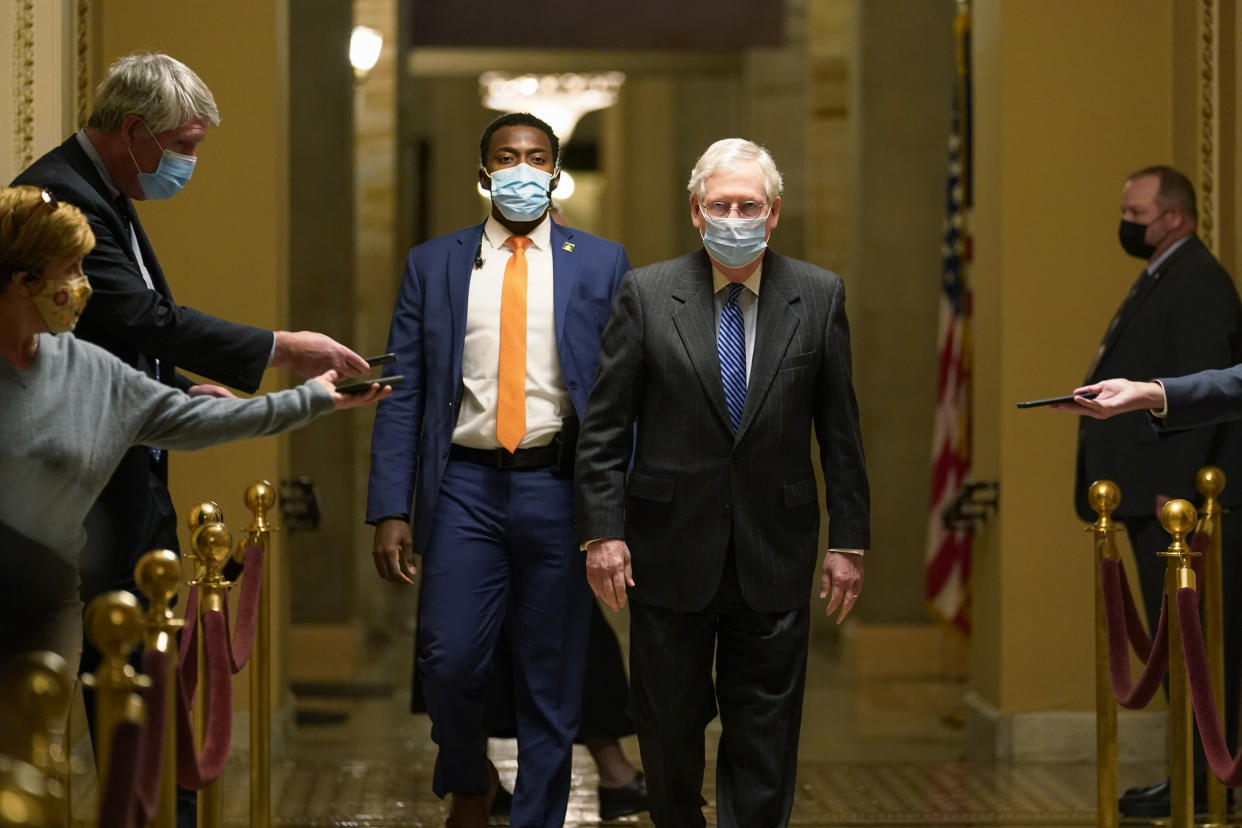The next stimulus deal will be even harder to get
Congress passed three coronavirus stimulus bills in March, and started working on a fourth bill in April. That’s the bill Congress is finally poised to pass this week—eight months later.
One reason it took so long to pass the fourth, $900 billion relief package was the 2020 elections, with both Democrats and Republicans making absurd demands to show voters how committed they were to core party principles prior to Election Day. Democratic House Speaker Nancy Pelosi, who now hails the $900 billion bill as a historic success, insisted in the fall that a fourth bill must entail at least $2.2 trillion in spending. Less is more, apparently. Republican Senate Majority Leader Mitch McConnell said in the fall it would be fiscally imprudent to spend more than $500 billion, but he has now signed off on nearly twice as much.
Many economists say that, while welcome and necessary, the latest $900 billion package still isn’t nearly enough to power the economy back from the huge decline in output and jobs that have followed widespread business shutdowns. There’s little aid for states and cities reeling from tax revenue shortfalls that are forcing the layoffs of cops, firefighters, teachers and other public-payroll workers. A new $300 weekly payment to unemployed workers will expire in March, well before vaccines are likely to be widespread and the economy back to normal. The new bill will extend an eviction moratorium set to expire on Dec. 31 by just one month.
Pelosi and many other Democrats say they’ll pass more stimulus as needed in 2021. Don’t count on that. The first issue is the Senate, now controlled by Republicans who tolerate deficit spending when a Republican is in the White House but become fiscal hawks when a Democrat is president. McConnell and a core group of fellow conservatives simply hate aid packages for cities and states, which they view as “blue-state bailouts” that let Democratic states off the hook for poor management of their own budgets.

Blue states such as New York and California do tax and spend more than red states such as Texas and Florida, with more generous protections for public unions. That doesn’t mean blue states are more profligate (with the possible exception of Illinois). But it still rankles conservatives enough to threaten any future state and local aid package. During the last recession, Congress approved some aid for states and cities, but Republicans blocked more aid, and a collapse in tax revenue forced about 800,000 state and local government layoffs, slowing the recovery. State and local governments have lost about 1 million workers since February, yet Republicans wouldn’t agree to more state and local aid in the latest bill.
Importance of Georgia Senate race
The two Senate runoff races in Georgia on Jan. 5 will have an outsized effect on future relief packages. If Republicans win just one of them, they’ll maintain control of the Senate and have veto power over any future legislation. It’s possible they might agree to more relief in the spring or summer—but they’ll have even less incentive to back a fifth stimulus plan than they do now.
One reason McConnell agreed to raise his ceiling for a fourth bill from $500 billion to $900 is those same Georgia elections. The two Democratic challengers have been bashing the Republican incumbents for opposing more stimulus and shorting ordinary workers, prompting McConnell to raise his bid as a sop to Georgia voters. That won’t be a factor after Jan. 5. The other change will be the Joe Biden presidency. There’s already evidence some Republicans want to rein in stimulus measures they supported under Trump, lest a Democratic president get credit for helping boost the economy.
If Democrats win both Senate seats, they’ll control Congress by one vote. But a slim majority won’t let them pass whatever legislation they want. At least a couple conservative Democrats could block some spending, and the Senate can only bypass filibuster rules to pass one spending bill per year without a 60-vote supermajority. So Democrats would get one shot at an additional stimulus bill if they control both houses of Congress and can muster agreement from essentially all of their members. If it sounds easy, you try it.
The two Georgia races are extremely tight, will polls showing... well, who trusts what polls say. Republicans seem to have an edge, since they only need to win one of the two seats, which would suggest the outlook for further stimulus is dim. Even so, Congress has authorized more than $4 trillion in stimulus spending since March, including the latest bill, which is vastly more than during any prior recession. And vaccine optimism could become a different form of stimulus by the spring. Republicans can’t veto that.
Rick Newman is the author of four books, including “Rebounders: How Winners Pivot from Setback to Success.” Follow him on Twitter: @rickjnewman. Confidential tip line: rickjnewman@yahoo.com. Click here to get Rick’s stories by email.
Read more:
Get the latest financial and business news from Yahoo Finance
Follow Yahoo Finance on Twitter, Facebook, Instagram, Flipboard, SmartNews, LinkedIn, YouTube, and reddit.
